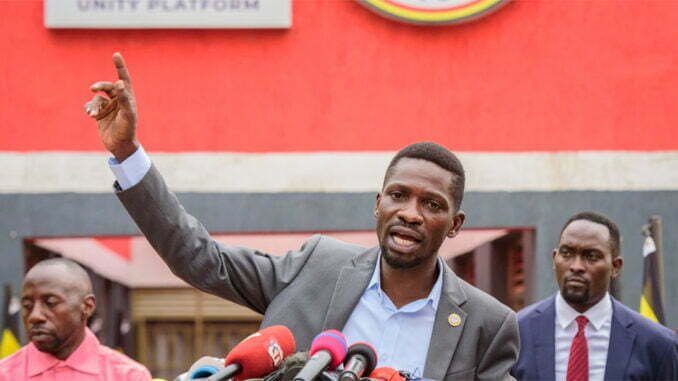
Kampala, Uganda | URN | The withdrawal of the petition by the National Unity Platform (NUP) candidate Robert Kyagulanyi Ssentamu alias Bobi Wine from the Supreme Court denied the country a renewed legal system, the Director of Legal Services in the ruling National Resistance Movement (NRM) party Oscar Kihika has noted.
On Friday, March 5th, 2021, the nine-member panel of the Supreme Court justices allowed Mr Kyagulanyi to withdraw his presidential election petition in which he had sought to overturn the victory of the incumbent President Yoweri Kaguta Museveni.
Mr Kyagulanyi ran to court on February 1st, 2021, accusing the Electoral Commission-EC of fraudulently declaring Museveni as the winner of the January 14th elections with 58 per cent of the total votes cast against his 35 per cent.
In his petition, Mr Kyagulanyi accused Mr Museveni of bribery, intimidation, ballot stuffing and sponsoring violence which resulted in arrests and death of people during the election process.
Mr Kyagulanyi accused the Attorney General who was a respondent to the suit of failure to implement the recommendations arising from the previous presidential election petitions aimed at improving the electoral processes in the country. He asked the court to nullify Mr Museveni’s victory and order for fresh elections.
However, Mr Kyagulanyi later instructed his legal team for withdrawal of the petition after losing two applications seeking to amend the petition and include fresh evidence. Mr Kyagulanyi also argued that his witnesses had been arrested, tortured and intimidated by security agencies.
On Friday 5th, March 2021, a panel of nine Supreme Court Justices led by the Chief Justice Alfonse Owiny-Dollo allowed Kyagulanyi to withdraw his petition.
Addressing journalists at the NRM party headquarters in Kampala on Sunday, Oscar Kihika, the NRM legal director said the country and the legal fraternity in particular have lost immensely because of the withdrawal of the petition.
“Normally decisions arising from presidential election petitions are a reservoir of the development of the law because on top of being a public interest suit, there are very many legal and technical points that are argued by lawyers and the Supreme Court normally takes this opportunity to pronounce its self on many principles and in the process, new precedents are actually formed,” said Kihika.
He said that the country has been denied an opportunity of having renewed jurisprudence arising out of the issues that had been raised in the election petition.
Mr Kihika also said the general public has also missed the chance of unveiling of Kyagulanyi’s falsehoods in the petition. He says that his team had evidence that the petitioner had intentionally defied the set rules of the election and made it look like he was persecuted and tendered in affidavits with forged signatures among other issues.
Mr Kihika also alleged that Mr Kyagulanyi’s case was full of contradictions and that the vote-rigging video evidence tendered in had been forged since it was captured two days after the election.
Read Also: Are Bobi Wine’s lawyers to blame for aborting his election petition?
However, Mr Kyagulanyi’s lawyer Anthony Wameli will not have any of this. He has equally accused Museveni’s lawyers and the other respondents of foul play. He questioned how Mr Kihika accessed that evidence he is referring to yet the court declined to receive the same.
He insists that Kyagulanyi had a strong case but the circumstances in the Court could not allow them to proceed with the case. He says that the allegations of forgery are baseless.
Wameli says that the withdrawal of the case has denied the country and court overwhelming evidence that his client was seeking to present.
A number of Supreme Court recommendations basing on previous presidential election petitions since 2001 have formed part of the country’s electoral reforms following their adoption by Parliament.



